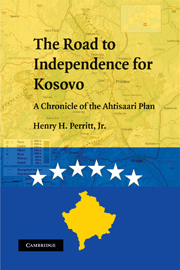Book contents
- Frontmatter
- Contents
- Acknowledgments
- Introduction
- 1 Riots in Kosovo
- 2 Albanian Resentment Comes to a Boil
- 3 Armed Conflict Grows
- 4 Cease-Fire Breaks Down
- 5 Establishing the United Nations' First Colony
- 6 Living Under a Colonial Regime
- 7 Responding to the Wake-Up Call
- 8 The Politics of Purgatory
- 9 Enter Martti Ahtisaari
- 10 The Stage for Final Status
- 11 “Practical” Negotiations
- 12 Negotiations over Status Itself
- 13 The Ahtisaari Plan
- 14 The Plan Runs into Trouble
- 15 The Troika Takes Over
- 16 Independence Day
- 17 Kosovo's Future
- 18 Implications for the International Order
- Glossary of Acronyms
- Bibliography
- Index
- References
18 - Implications for the International Order
Published online by Cambridge University Press: 22 January 2010
- Frontmatter
- Contents
- Acknowledgments
- Introduction
- 1 Riots in Kosovo
- 2 Albanian Resentment Comes to a Boil
- 3 Armed Conflict Grows
- 4 Cease-Fire Breaks Down
- 5 Establishing the United Nations' First Colony
- 6 Living Under a Colonial Regime
- 7 Responding to the Wake-Up Call
- 8 The Politics of Purgatory
- 9 Enter Martti Ahtisaari
- 10 The Stage for Final Status
- 11 “Practical” Negotiations
- 12 Negotiations over Status Itself
- 13 The Ahtisaari Plan
- 14 The Plan Runs into Trouble
- 15 The Troika Takes Over
- 16 Independence Day
- 17 Kosovo's Future
- 18 Implications for the International Order
- Glossary of Acronyms
- Bibliography
- Index
- References
Summary
Analysis of the diplomatic process leading to Kosovo's independence leads to the following conclusions: First, Russia could not have been brought around to any solution acceptable to the Kosovar Albanians or to Europe and the United States. Russia wanted something inimical to Europe, the United States, and the people of Kosovo – continued uncertainty and instability in the Balkans.
Second, Serbia was a prisoner of a historical myth implanted through the years, and a racist sense of ethnic superiority that made it impossible for it to credit the aspirations of the Kosovar Albanians and thus to craft a solution acceptable to both sides. Regardless of its leadership's calculation of Serbia's national interests, public opinion represented too many obstacles for statesmanship.
Third, Martii Ahtisaari and the Western members of the Troika demonstrated how to forge transatlantic unity by forging personal relationships of trust and by paying careful attention to the local politics of important constituencies.
Fourth, international law's role in the process was poorly understood, but the independence of Kosovo marks a significant step into an international law that balances sovereignty against the responsibility to protect.
Fifth, the output of intelligence agencies was irrelevant to the negotiations and the determination of negotiating positions mainly because of the poor quality of the intelligence.
Sixth, decision making occurred, as it usually has in the Balkans, only under the threat of violence, although effective diplomacy forestalled the actual outbreak of violence.
- Type
- Chapter
- Information
- The Road to Independence for KosovoA Chronicle of the Ahtisaari Plan, pp. 255 - 278Publisher: Cambridge University PressPrint publication year: 2009



